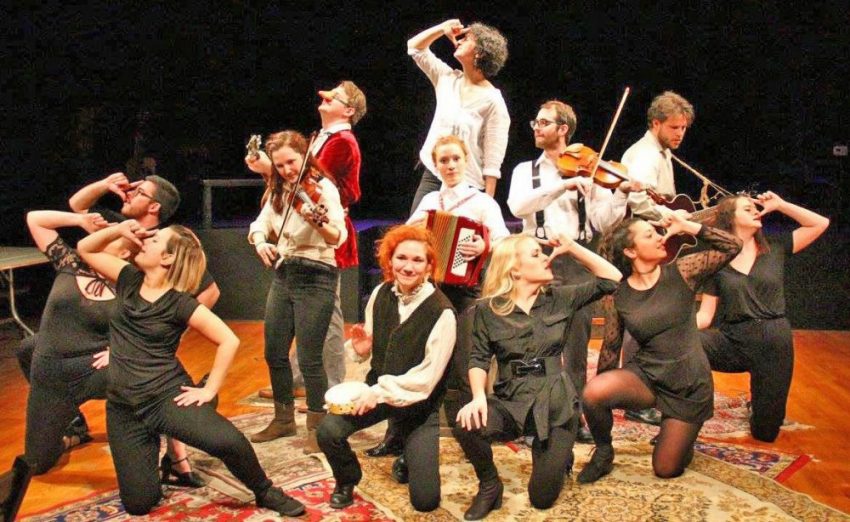
The Nose, by Nikolai Gogol. EgoPo Classic Theater, Philadelphia, January 2017
In the midst of its season devoted to Russian classics, the EgoPo theater company scheduled a fund-raising cabaret evening that would include an original staging of Gogol’s short story, The Nose.
The adaptation by the 24-year-old member of the company, Dane Eissler, so impressed the company’s artistic director Lane Savadove that he added three public performances of The Nose. Eissler wrote the script, the music and lyrics (with Tyler Garamella), designed costumes, constructed a variety of noses, and directed the production. Patrons sat at tables drinking and eating such Russian foods as olad’ya (potato pancakes) and blintzes.
The immersive experience brought to mind the musical Natasha, Pierre & The Great Comet of 1812, currently on Broadway, which sets Tolstoy’s War and Peace in an opulent Russian salon that fills the interior of the theater.
It was happily coincidental (or prescient) for EgoPo to plan a season devoted to Russian culture at a time when relations between the United States and Russia have become so tense. Its four productions give us insight into the culture of that nation, and — alone among the four — The Nose addresses the workings of the Russian government.
Gogol wrote about the bureaucracy of the czars in 1836. (And Dmitri Shostakovich turned it into an opera in 1928 that mocked the Stalinist government, filled with musical absurdities.) Gogol’s story tells of a civil servant officer who awakes to discover that his nose has vanished. This literal loss-of-face is exacerbated when the man discovers that his nose is walking the streets dressed in a uniform superior to his own and is receiving governmental promotions. In Eissler’s translation, an appointment to head “an important government department” is at stake.
The title in Russian (“Nos“) is the reverse of the Russian word for “dream”, which justifies Eissler’s wild, imaginative, dreamlike staging of the protagonist’s desperate efforts to be reunited with his nose. His music is a mix of old Russian balalaika and David Bowie, and the words include calling the man’s butchered face “as flat as a potato pancake” and the rhyming quip “bon voyage, schnoz.”
A seven-piece band accompanied a large cast that included many of the table-servers. Andrew Clotworthy, Kelly Filios, Jenna Kuerzi, Tori Mittelman, Michael Pliskin, Evan Raines and Emily Schuman threw themselves into the main roles with abandon.
Eissler is a former pupil of Lane Savadove in the theater department of Rowan University, and a young actor (he appeared in EgoPo’s Gint). He also is cast as Medvedenko in Anton Chekhov’s The Seagull immediately afterwards, directed by Savadove. Eissler’s talents are prodigious and precocious; his future work must be watched. Nevertheless, one aspect of Gogol’s story should have received more attention. While the onstage characters were involved with a romantic courtship and witchcraft, not enough scrutiny was given to the oppressive machinations of the government bureaucracy.
An earlier draft of this review appeared in Broad Street Review